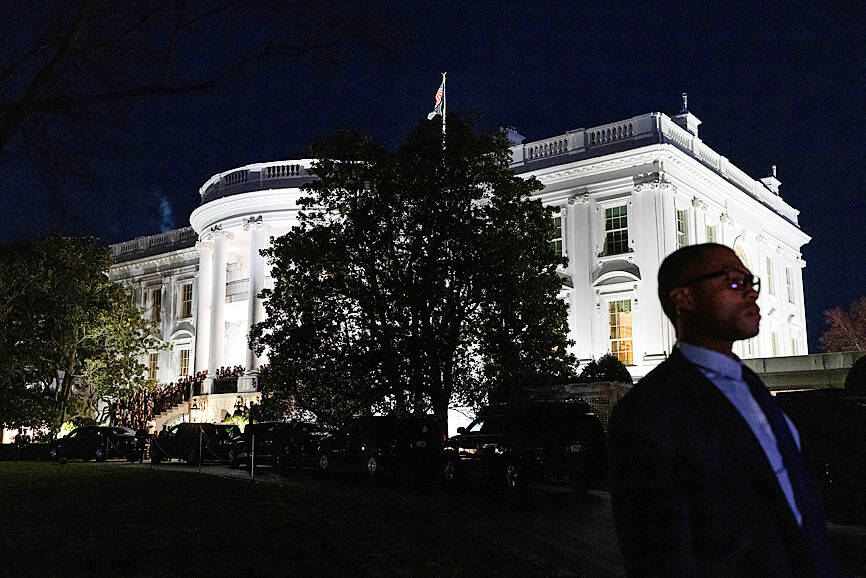The White House’s 2025 fiscal budget proposal, released on Monday, includes a US$100 million request to assist Taiwan in enhancing deterrence capabilities, and maintaining peace and stability in the Taiwan Strait.
The funding would help the US Department of State and the US Agency for International Development bolster and expand Taiwan’s collaboration with international partners, the department said in a statement.
It described the US$100 million request as a “historic investment in Taiwan’s security” through the Foreign Military Financing (FMF) mechanism “to strengthen deterrence and maintain peace and stability across the Taiwan Strait.”

Photo: Reuters
The request comes after US President Joe Biden signed off on a US$80 million grant through the FMF in November last year to bolster Taiwan’s military capabilities.
US Deputy Secretary of State for Management and Resources Richard Verma said it was “historic” because it would create a dedicated funding item for Taiwan.
“We break out Taiwan for the first time and have a specific line item for it. It reaffirms our commitment to security assistance for Taiwan, and to a free and open Indo-Pacific. I think it’s very clear. I think it stands on its own,” Verma said.
Regarding whether the funding would provide for a permanent training mission for US special forces in Taiwan, Verma said he did not think so, adding that it was just “traditional security assistance.”
“There’s also IMET [International Military Education and Training] assistance, and again, you have to read that together with the totality of our assistance in the Indo-Pacific Strategy and the new mandatory funding we’ve also added,” he said.
IMET is intended to establish rapport between the US military and those of other nations to build alliances.
In a separate budget overview released by the US Department of Defense, its proposal includes a US$500 million request to replenish US weapons stocks in Taiwan using the Presidential Drawdown Authority.
The “first-time funding request” would “address aggression in the region and ensure continued support to our allies,” while enabling the Pentagon to replace its inventory of “munitions and equipment and maintain readiness,” the defense department said.
Additional reporting by Bloomberg

CHAOS: Iranians took to the streets playing celebratory music after reports of Khamenei’s death on Saturday, while mourners also gathered in Tehran yesterday Iranian Supreme Leader Ayatollah Ali Khamenei was killed in a major attack on Iran launched by Israel and the US, throwing the future of the Islamic republic into doubt and raising the risk of regional instability. Iranian state television and the state-run IRNA news agency announced the 86-year-old’s death early yesterday. US President Donald Trump said it gave Iranians their “greatest chance” to “take back” their country. The announcements came after a joint US and Israeli aerial bombardment that targeted Iranian military and governmental sites. Trump said the “heavy and pinpoint bombing” would continue through the week or as long

TRUST: The KMT said it respected the US’ timing and considerations, and hoped it would continue to honor its commitments to helping Taiwan bolster its defenses and deterrence US President Donald Trump is delaying a multibillion-dollar arms sale to Taiwan to ensure his visit to Beijing is successful, a New York Times report said. The weapons sales package has stalled in the US Department of State, the report said, citing US officials it did not identify. The White House has told agencies not to push forward ahead of Trump’s meeting with Chinese President Xi Jinping (習近平), it said. The two last month held a phone call to discuss trade and geopolitical flashpoints ahead of the summit. Xi raised the Taiwan issue and urged the US to handle arms sales to

State-run CPC Corp, Taiwan (CPC, 台灣中油) yesterday said that it had confirmed on Saturday night with its liquefied natural gas (LNG) and crude oil suppliers that shipments are proceeding as scheduled and that domestic supplies remain unaffected. The CPC yesterday announced the gasoline and diesel prices will rise by NT$0.2 and NT$0.4 per liter, respectively, starting Monday, citing Middle East tensions and blizzards in the eastern United States. CPC also iterated it has been reducing the proportion of crude oil imports from the Middle East and diversifying its supply sources in the past few years in response to geopolitical risks, expanding

An Emirates flight from Dubai arrived at Taiwan Taoyuan International Airport yesterday afternoon, the first service of the airline since the US and Israel launched strikes against Iran on Saturday. Flight EK366 took off from the United Arab Emirates (UAE) at 3:51am yesterday and landed at 4:02pm before taxiing to the airport’s D6 gate at Terminal 2 at 4:08pm, data from the airport and FlightAware, a global flight tracking site, showed. Of the 501 passengers on the flight, 275 were Taiwanese, including 96 group tour travelers, the data showed. Tourism Administration Deputy Director-General Huang He-ting (黃荷婷) greeted Taiwanese passengers at the airport and